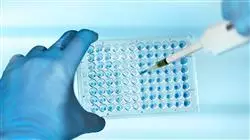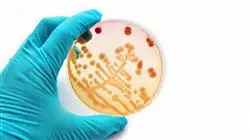University certificate
The world's largest faculty of medicine”
Introduction to the Program
Acquire the necessary specialization to compete among the best in the area of Biomedicine in the field of Clinical Analysis with this Postgraduate Diploma of first academic and technological level"

This Postgraduate Diploma brings together the most specialized and updated theoretical contents, existing at present, with respect to other programs of similar subject matter. Furthermore, in this particular module, the associated theoretical and practical material is of vital importance, since the explanation of the techniques and their complete understanding requires numerous visual and pedagogical support materials of the highest quality, at the service of the innovative methodology that characterizes us.
This Postgraduate Diploma will provide the clinical professional with specialized knowledge in the approach to blood pathologies, both oncological and non-oncological or benign, with the goal of obtaining the necessary tools to be able to make an adequate differential diagnosis of the different hemopathologies.
Throughout the Postgraduate Diploma, the laboratory study will also be approached with the analysis and peripheral blood smear. In addition to other more complex tests, it allows a comprehensive and specialized diagnosis of the most relevant hematological diseases.
Another of the areas of knowledge in which students will develop is the immune system, its molecular and cellular components and the interactions that are produced between them in order to organize the immune response. They will analyze
the immune mechanisms responsible for pathologies such as hypersensitivity, autoimmunity, transplants, immunodeficiency or cancer. And finally, it establishes the immunoanalytical techniques most commonly used in a clinical analysis laboratory.
Additionally, this TECH program will enable students to broaden their knowledge and skills through a group of intensive Masterclasses. The latter will be given by a prestigious international expert who has accumulated experience and advanced results in this field. and advanced results in this field, as well as various awards.
The International Guest Director of this Postgraduate Diploma is a true pioneer and innovator in the scientific and research field of Clinical Analysis"
This Postgraduate Diploma in Biomedicine in the Field of Clinical Analysis contains the most complete and up-to-date scientific program on the market.Its most notable features are:
- The latest technology in online teaching software
- A highly visual teaching system, supported by graphic and schematic contents that are easy to assimilate and understand
- Practical cases presented by practicing experts
- State-of-the-art interactive video systems.
- Teaching supported by telepractice
- Continuous updating and recycling systems
- Autonomous learning: full compatibility with other occupations
- Practical exercises for self-assessment and learning verification
- Support groups and educational synergies: questions to the expert, debate and knowledge forums.
- Communication with the teacher and individual reflection work
- Content that is accessible from any fixed or portable device with an Internet connection
- Supplementary documentation databases are permanently available, even after the course has finished
Acquire the professional skills from a Postgraduate Diploma in Biomedicine in the field of Clinical Analysis and start competing with the best job prospects"
The program’s teaching staff includes professionals from the sector who contribute their work experience to this educational program, as well as renowned specialists from leading societies and prestigious universities.
The multimedia content, developed with the latest educational technology, will provide the professional with situated and contextual learning, i.e., a simulated environment that will provide immersive education programmed to learn in real situations.
This program is designed around Problem-Based Learning, whereby the professional must try to solve the different professional practice situations that arise during the course. For this purpose, students will be assisted by an innovative interactive video system created by renowned and experienced experts.
A specialization created and directed by professionals in this area of work, which makes this Postgraduate Diploma a unique opportunity for professional growth"

The learning of this Postgraduate Diploma is supported by the most developed didactic means in online teaching to guarantee that your effort will have the best possible results"
Why study at TECH?
TECH is the world’s largest online university. With an impressive catalog of more than 14,000 university programs available in 11 languages, it is positioned as a leader in employability, with a 99% job placement rate. In addition, it relies on an enormous faculty of more than 6,000 professors of the highest international renown.

Study at the world's largest online university and guarantee your professional success. The future starts at TECH”
The world’s best online university according to FORBES
The prestigious Forbes magazine, specialized in business and finance, has highlighted TECH as “the world's best online university” This is what they have recently stated in an article in their digital edition in which they echo the success story of this institution, “thanks to the academic offer it provides, the selection of its teaching staff, and an innovative learning method aimed at educating the professionals of the future”
A revolutionary study method, a cutting-edge faculty and a practical focus: the key to TECH's success.
The most complete study plans on the university scene
TECH offers the most complete study plans on the university scene, with syllabuses that cover fundamental concepts and, at the same time, the main scientific advances in their specific scientific areas. In addition, these programs are continuously being updated to guarantee students the academic vanguard and the most in-demand professional skills. In this way, the university's qualifications provide its graduates with a significant advantage to propel their careers to success.
TECH offers the most comprehensive and intensive study plans on the current university scene.
A world-class teaching staff
TECH's teaching staff is made up of more than 6,000 professors with the highest international recognition. Professors, researchers and top executives of multinational companies, including Isaiah Covington, performance coach of the Boston Celtics; Magda Romanska, principal investigator at Harvard MetaLAB; Ignacio Wistumba, chairman of the department of translational molecular pathology at MD Anderson Cancer Center; and D.W. Pine, creative director of TIME magazine, among others.
Internationally renowned experts, specialized in different branches of Health, Technology, Communication and Business, form part of the TECH faculty.
A unique learning method
TECH is the first university to use Relearning in all its programs. It is the best online learning methodology, accredited with international teaching quality certifications, provided by prestigious educational agencies. In addition, this disruptive educational model is complemented with the “Case Method”, thereby setting up a unique online teaching strategy. Innovative teaching resources are also implemented, including detailed videos, infographics and interactive summaries.
TECH combines Relearning and the Case Method in all its university programs to guarantee excellent theoretical and practical learning, studying whenever and wherever you want.
The world's largest online university
TECH is the world’s largest online university. We are the largest educational institution, with the best and widest online educational catalog, one hundred percent online and covering the vast majority of areas of knowledge. We offer a large selection of our own degrees and accredited online undergraduate and postgraduate degrees. In total, more than 14,000 university degrees, in eleven different languages, make us the largest educational largest in the world.
TECH has the world's most extensive catalog of academic and official programs, available in more than 11 languages.
Google Premier Partner
The American technology giant has awarded TECH the Google Google Premier Partner badge. This award, which is only available to 3% of the world's companies, highlights the efficient, flexible and tailored experience that this university provides to students. The recognition as a Google Premier Partner not only accredits the maximum rigor, performance and investment in TECH's digital infrastructures, but also places this university as one of the world's leading technology companies.
Google has positioned TECH in the top 3% of the world's most important technology companies by awarding it its Google Premier Partner badge.
The official online university of the NBA
TECH is the official online university of the NBA. Thanks to our agreement with the biggest league in basketball, we offer our students exclusive university programs, as well as a wide variety of educational resources focused on the business of the league and other areas of the sports industry. Each program is made up of a uniquely designed syllabus and features exceptional guest hosts: professionals with a distinguished sports background who will offer their expertise on the most relevant topics.
TECH has been selected by the NBA, the world's top basketball league, as its official online university.
The top-rated university by its students
Students have positioned TECH as the world's top-rated university on the main review websites, with a highest rating of 4.9 out of 5, obtained from more than 1,000 reviews. These results consolidate TECH as the benchmark university institution at an international level, reflecting the excellence and positive impact of its educational model.” reflecting the excellence and positive impact of its educational model.”
TECH is the world’s top-rated university by its students.
Leaders in employability
TECH has managed to become the leading university in employability. 99% of its students obtain jobs in the academic field they have studied, within one year of completing any of the university's programs. A similar number achieve immediate career enhancement. All this thanks to a study methodology that bases its effectiveness on the acquisition of practical skills, which are absolutely necessary for professional development.
99% of TECH graduates find a job within a year of completing their studies.
Postgraduate Diploma in Biomedicine in the Field of Clinical Analysis
In recent years, new scientific advances have emerged such as biomedicine, which allows the analysis and study of biological aspects in the clinical area. This area is notoriously related to clinical trials, since it allows to diagnose and investigate certain aspects in a more precise way. Being a relevant area in many processes, TECH Global University developed a Postgraduate Certificate Postgraduate Certificate in Biomedicine in the field of Clinical Analysis. An online postgraduate course specialized in the analytical approach to blood, oncological or benign pathologies. Through the syllabus designed by a team of experts, you will approach the analysis of the immune system, its molecular or cellular components and the interactions that occur between them, with the aim of organizing the immune response. You will also delve into the mechanisms responsible for pathologies such as hypersensitivity, cancer and immunodeficiency or autoimmunity. You will study through an innovative learning system, made up of lectures, multimedia material and practical exercises that will progressively reinforce your knowledge. Thanks to this, you will achieve professional excellence and obtain the necessary skills to work in a clinical analysis laboratory, using the most advanced techniques and protocols of the moment.
Learn about biomedicine applied to clinical studies
In this program designed by the best specialists of the Faculty of Medicine of TECH, you will find the most complete contents related to this field, both in scientific and methodical disciplines. During the six months of preparation, you will delve into the immunoanalytical and instrumental techniques most commonly used in a clinical trial laboratory, from microscopic, microbiological, spectral and volumetric methods, to gravimetric, electrochemical and molecular biology or cell counting. Next, you will approach hematology, its quantitative and qualitative alterations of blood cells, the study in peripheral blood and abnormalities in white blood cells. Finally, you will delve into the immunology used to examine the processes that occur in autoimmune pathologies such as alopecia, hepatitis, type 1 diabetes and rheumatoid arthritis, among others. At the end of these thematic modules, you will be proficient in handling all the procedures used in a laboratory, including instrument handling, sample collection (validation, calibration, automation) and information processing.







